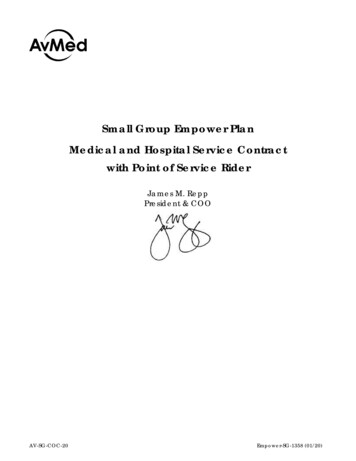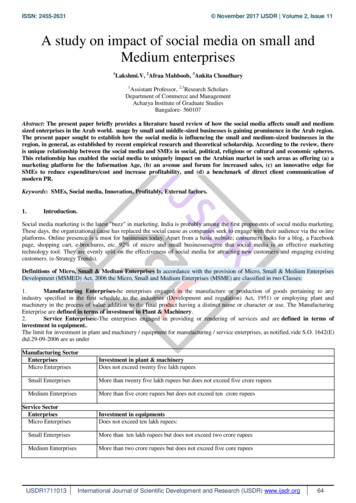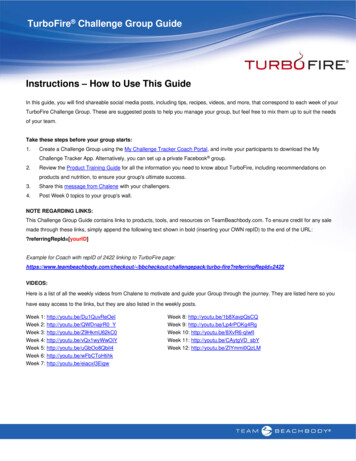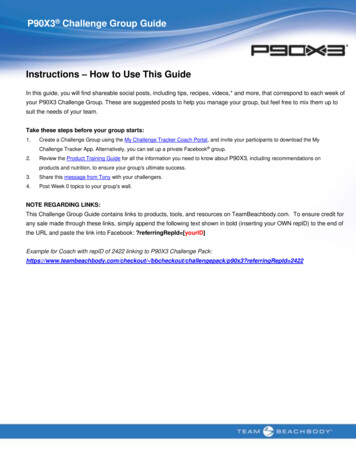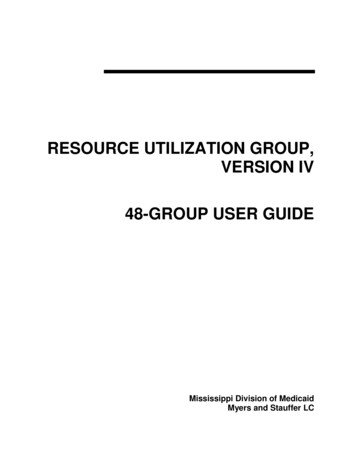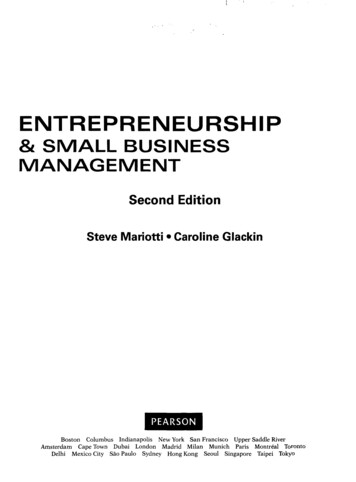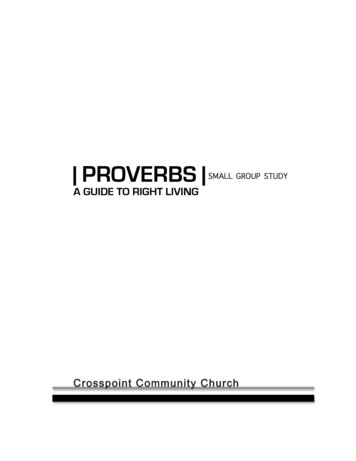
Transcription
PROVERBS SMALL GROUP STUDYA GUIDE TO RIGHT LIVINGCrosspoint Community Church
Proverbs is an eight‐week studythat focuses on right living ineveryday situations.Each week will encourage your group toshare stories, study God’s word, andsupport one another through prayer.CONTENTSweek 1: Wisdomweek 2: Integrityweek 3: Humilityweek 4: Generosityweek 5: Contentmentweek 6: Relationshipsweek 7: Gossipweek 8: Diligence
Introduction Many people tend to compartmentalize their faith. Most people have what is called aGod‐box. Their God‐box contains all activities pertaining to God. Activities like prayer,reading the Bible, going to church, and serving in a ministry are all part of their God‐box.And people can access their God‐box as much as or as little as they want. Those whoopen their God‐box more frequently than others tend to feel spiritually superior tothose around them. This often results in spiritual pride.The more foundational problem with God‐box living, however, is the dissonance that itcreates between spirituality and life. Spirituality becomes divorced from everydaysituations and scenarios. The potential to interface with God is reduced to a list ofactivities. When these activities are not being actively pursued, God is put back in thebox and placed on the appropriate shelf. Out of sight and out of mind. Perhaps this iswhy so many people think they have a ticket that will get them into heaven, but haveyet to experience any meaningful life change.There is no such thing as God‐box living when it comes to the Bible.The truth is that everything is spiritual. Every dimension of life is packed with spiritualmeaning and significance. A divide between the sacred and the secular is utterlyunimaginable. God created it all. He is connected to all that is. And so the arena forspiritual formation cannot be reduced to spiritual activities like prayer, reading theBible, attending church, and so on. Life itself is viewed as the context for spiritualgrowth. Everyday scenarios and situations are pregnant with spiritual significance—going to the grocery store or filling the gas tank, taking a walk or mowing the lawn,eating or sleeping, spending time with the family or friends, all of it is spiritual becauseall of life is spiritual.The Bible is about a lot more than what happens after death—but certainly not less!The Bible concerns itself with everyday life. And nothing could be more on target thanwhen we turn to the book of Proverbs.Proverbs provides for us a guide to right living.Proverbs instructs us on how to handle the everyday situations and encounters of life ina way that contributes to our spiritual formation. As such, it concerns itself withpositive instruction in the areas of wisdom and integrity, generosity and humility,forgiveness and justice. And at the same time, it warns against things like foolishnessand stubbornness, impurity and lust, anger and unforgiveness, gossip and slander.While there are certainly longer sections of discourse, the majority of Proverbs consistsof short and compact statements that teach truths about human behavior andrelationships. The use of figurative language, similes, repetition, comparisons, andmetaphors are employed throughout for creative instruction.
The book of Proverbs has extraordinary relevancy for contemporary living.The practicality of Proverbs is actually quite remarkable when you consider thatportions of it were written almost 3,000 years ago! While several different authorscontributed and editions were probably made during compilement, Solomon is likelyresponsible for authoring much of the book. The book was originally written to instructyoung men on the practicality of living with right values. It was designed to help youngmen mature into adulthood with the capability of making wise choices. But itsapplicability certainly extends beyond the original target audience. It has served as aguide to right living for a countless number of people over the last few millennia. Structure & Authors Themes 1‐9 – The Proverbs of Solomon, son of David, king of Israel10:1‐22:16 – Proverbs of Solomon22:17‐24:22 – Sayings of the Wise24:23‐34 – More Sayings of the Wise25‐29 – More Proverbs of Solomon transcribed by the men of Hezekiah30 – Sayings of Agur31 – Sayings of LemuelThe Book ofProverbsFigurative imiles Literary Devices ipBtw. 970 – 687 BC Date Proverbs does not contain a list of promises or statements about how life will turn out ifone follows a certain course of action. The book speaks in generalities. In general, it istrue that if parents raise their children in the way of right living, then their children willbe more inclined to live rightly when they come of age. But this is by no means anunequivocal promise. It is a general statement about the importance of providingproper parenting. And certainly there are exceptions to the rule. No one would denythat some kids turn out horribly despite tremendous parenting. Great confusion andmisunderstanding can be avoided when we recognize that Proverbs does not alwaysdeal with the footnotes and particularities of every life situation.But this is not to downplay its applicability or relevance. Even when we find ourselvesdealing with the footnotes of life, Proverbs will still provide for us a guide to right living.It will still encourage us to break free from our God‐box living.So get ready to live outside of the box.
SESSION 1 WisdomIntroductionHG leader, read the following out loud:Some people equate wisdom with knowledge. The accumulation of knowledge is believed to be theway to wisdom. So the more knowledge a person acquires, the wiser a person becomes. And thisidea is not without merit. Knowledge and wisdom are certainly connected. After all, it would bedifficult to be wise and ignorant at the same time. But notice that knowledge doesn’t guaranteewisdom either. One can have knowledge and still make poor life choices.So how do these two connect?While knowledge forms the foundation to wisdom, wisdom ultimately extends beyond knowledge.Perhaps we could say that wisdom is knowledge rightly applied in any given circumstance. It’s notjust about knowledge. It’s not just about knowing stuff. It’s about applying the right knowledge atthe right time in the right way.The most prominent theme in the book of Proverbs is that of wisdom. And the foundation for thiswisdom is a personal knowledge of God and his ways. But knowing God’s ways is never enough.One must live them out. The knowledge of God and his ways must be applied at the right timeand in the right way in every circumstance of life.Wisdom is the skill of living life in the way of God.It’s about living in right relationship to God and others.HG leader, quickly organize a rock-paper-scissors tournament! Best two out ofthree. Only winners advance. Have the winner open your group in prayer.Tell Your StoriesIt is now time for you to connect with one another in a more intentional way. Part of being ahome group is getting to know one another and building friendships with each other. One of thebest ways to do this is by sharing stories. Deeper relationships will begin to form as you share thedifferent things that you have experienced in your life and hear about the experiences of others.Below are some questions to talk about as a group that should get people sharing their stories.QUESTIONS:1. Who do you consider to be a wise person? Tell your group about one person that you know to be reallywise. What makes that person so wise in your estimation? Give an example.2. What is one wise and one foolish choice you have made in your life? Share with your group the story behindeach one. What were the consequences?
Leadership Tips: Do not go in a circle. Try to create an atmosphere where people share when they areready. Encourage people to share without being pushy. Make sure everyone shares. Be sensitive to those who take a bit longer to share their liveswith others. But try to prevent one person from sharing too much and dominating thegroup discussion time. Listen intently and ask follow-up questions to show that you are engaged in the discussion.Once everyone has had the opportunity to tell some stories in response to the above questions,you can transition your group into the next part of your gathering—the part where you study theBible together.Engage God’s WordA home group is not just a Bible study. You are not a group of study buddies. That is why youhave spent the first part of your group sharing stories—because building friendships is an importantpart of being in a home group. But a home group is not just a social gathering either. You arenot just a group of friends. What makes a home group different from a bowling league or softballteam is that the people within the group want to become more like Jesus. One of the best waysto become more like Jesus is by studying, discussing, and responding to God’s word as a group.HG leader, divvy up the selected proverbs among your group and read out loud:1:72:1-113:5-713:1013:20Leadership Tips: Consider reading from a few different translations. Sometimes different versions canspark different insights. Reading a passage more than once also helps it sink in more. Use the questions below as a springboard for discussion. Do not feel like you have tofollow the study guide religiously or hit every question. These questions have beendesigned to help spark discussion in your group. Refer to them as needed.DISCUSSION QUESTIONS:1. Look at 1:7. What does “the fear of the Lord” mean? Why is this considered the foundation of wisdom?12. Do you agree with 1:7? How have you experienced or observed the truth of this verse in your life?3. Look at 2:1-11. What are the benefits of applying wisdom and understanding to your life?24. How can you be intentional about applying wisdom and understanding to your life? Be specific.35. Look at 3:5-7. How do trusting in the Lord and using your own discernment intersect?46. When have you been pushed to really trust God with your life? Tell a story and share the result.7. Look at 13:10. Do you find it hard or easy to receive advice? Do you often resent advice (15:12)?7. Look at 13:20. Do you think this is true? How have you seen this in your own life or the lives of others?APPLICATION QUESTIONS:1. Are you living your life as someone who is wise or foolish? Revisit 1:7 if necessary.52. What areas of your life need to be submitted to God? What areas need to be fully entrusted to him?3. Are you walking with the wise? Are your relationships positively or negatively impacting you?EXERCISE:Read chapters 2-4 of Proverbs each day this week.
Pray for One AnotherIt is good to share your stories. And it is good to talk about the Bible. But it is also important tohear what is going on in each other’s life so that you can encourage and support one another. Oneof the best ways to accomplish that task is to take up prayer requests. Here are some directionsto help you organize this time:DIRECTIONS:Give each person a small piece of paper. Instruct them to write their name on the top with a shortdescription of their prayer request. Have each person fold their piece of paper and place it in abowl located in the center of your group. Once everyone has submitted his or her prayer request,have each person draw out a name. Make sure no one draws out his or her own name. Then, goaround in a circle and have each person call out the name they drew. Each time a name isannounced, have that person describe his or her prayer request to the group. After everyone hasshared, close with each member praying for the person they drew out of the bowl. Encouragegroup members to take the prayer requests they drew out of the bowl with them throughout theweek. This will ensure that each person in your group is being prayed for every day of the week.Leadership Tips: Discourage people from sharing prayer requests for other people. These kinds of prayerrequests will lead to a superficial home group. Encourage individuals to share prayerrequests related to their own concerns, struggles, and needs. Don’t pressure people to share beyond what they are comfortable sharing. While everyoneis expected to share a prayer request, nobody should be required to share the mostintimate aspects of their lives. Keep things moving. This is not the time for a group counseling session. Be sensitive to those who may not be ready to pray out loud—especially if they are newto your group. Consider designating someone to cover their prayer request until they aremore comfortable praying with others.See You Next Week!!!NOTES:1. This is a major theme in Proverbs. The phrase “the fear of the Lord” occurs 11 different times. The fear ofthe Lord involves a reverence for God and submission to His commands and ways. This is considered thefoundation of wisdom because God is the source of all wisdom. The Hebrew word for “beginning” implies the“start” of something. Fear of God is the start of becoming wise. One cannot become a person of wisdom viaany other starting point.2. Notice the “if then ” flow of these verses. The benefits of applying wisdom are outlined in 6-12. Do youthink these are unequivocal promises? Are these always true? Do you think there are exceptions?3. The goal of this question is to move your group beyond just thoughts and ideas. What can you do topractically pursue and apply wisdom in your life? Try to be as specific as possible.4. Does trusting God and not leaning on your own understanding imply that you never rely on your owninstincts? How do you balance these two out in your life? What does this look like for you?5. The footnote in your Bible should indicate that a “fool” denotes a person that is morally deficient—that is, aperson that lacks spiritual perception and moral obedience to God in every day living.
SESSION 2 IntegrityIntroductionHG leader, read the following out loud:Integrity. It’s hard to find, isn’t it?People of integrity are small in number. In fact, we live in a culture where a lack of integrity isalmost expected. We see it among politicians and professional athletes, movie stars andsongwriters, business execs and even religious reps. There are no exceptions. And the reality isthat most of us live broken and fragmented lives. We’re all hypocrites to some degree or another.Our decisions and choices are often inconsistent and involve compromise. Our behaviors andactions are frequently dictated by impromptu cravings and impulsive desires. We live lives that areconflicting and contradictory.Integrity is the quality or state of being perfectly integrated and complete, undivided and unbroken.A person of integrity lives in a way that is consistent in every dimension and circumstance of life.It doesn’t matter where they are. It doesn’t matter what the circumstance. Every decision andchoice, behavior and action, is rooted in a way of life that is undivided and unbroken, consistentand without compromise—regardless of who is looking. So, who are you when no one is looking?The truth is that someone is always looking. We just tend to forget. Most of our moral failurestake place in moments when we forget God’s omnipresence. And while the implications of God’somnipresence are admittedly overwhelming—for he witnesses our deepest failures—it is ultimatelyGod’s ever-present help that leads us into the way of integrity.The way of integrity is the way of Yahweh.Integrity involves consistently walking in the way of Yahweh without compromise.HG leader, identify the person with the biggest feet in your home group. Havethat person open your group with a word of prayer. You’re up Bigfoot!Tell Your StoriesIt is now time for you to connect with one another in a more intentional way. Part of being ahome group is getting to know one another and building friendships with each other. One of thebest ways to do this is by sharing stories. Below are some questions to talk about as a group thatshould get people sharing their stories.QUESTIONS:1. When have you lacked integrity? Share a story about a time when your lack of integrity was exposed orfound out. What happened? What was the result? And what did you learn from the experience?2. When have you been rewarded for showing integrity? Share a story about a time when you were positivelyrewarded for doing the right thing. How did this impact you? How did it make you feel?
Leadership Tips: Do not go in a circle. Try to create an atmosphere where people share when they areready. Encourage people to share without being pushy. Make sure everyone shares. Be sensitive to those who take a bit longer to self-disclose.But try to prevent one person from sharing too much and dominating the discussion time. Listen intently and ask follow-up questions to show that you are engaged in the discussion.Once everyone has had the opportunity to tell some stories in response to the above questions,you can transition your group into the next part of your gathering—the part where you study theBible together.Engage God’s WordA home group is a place where people support one another in becoming more like Jesus. And oneof the best ways to do this is by studying, discussing, and responding to God’s word together.Here are some Scripture passages and questions to get you started.HG leader, divvy up the selected proverbs among your group and have each ofthem read out loud:15:910:916:2-330:124:26-27Leadership Tips: Consider reading from a few different translations. Sometimes different versions canspark different insights. Reading a passage more than once also helps it sink in more. Use the questions below as a springboard for discussion. Do not feel like you have tofollow the study guide religiously or hit every question. These questions have beendesigned to help spark discussion in your group. Refer to them as needed.DISCUSSION QUESTIONS:1. How would you define integrity? Does Proverbs 15:9 help with forming a definition? If so, how?12. How would you summarize 10:9 in your own words? Do you think this is generally true? Why or why not?23. When have you done something you knew was wrong? Did you experience a lack of peace right afterwards?4. Look at 16:2. Do you think motivations are important when it comes to integrity? Why or why not?35. Look at 16:3. What is this verse saying? Do you think that this verse could be misconstrued?46. Have you ever experienced God’s blessing in your life after surrendering something to Him? Share the story.7. Look at 30:12. When have you been pure in your own eyes? Do you ever justify wrong behavior?8. Look at 4:26-27. How could making decisions in advance help you pursue integrity?5APPLICATION QUESTIONS:1. Are you a person of integrity? What areas in your life do you lack integrity?62. What safeguards could you put in place to guard against these areas of weakness?3. Who could you share matters of integrity with for the purposes of accountability?EXERCISE:Your challenge for this week is threefold: First, identify three vulnerable areas in your life regarding integrity.Second, identify some safeguards you can put in place for each area. Last, tell a close friend or someone thatyou can trust about these vulnerabilities and safeguards.
Pray for One AnotherIt is good to share your stories. And it is good to talk about the Bible. But it is also important tohear what is going on in each other’s life so that you can encourage and support one another. Oneof the best ways to accomplish that task is to take up prayer requests. Here are some directionsto help you organize this time:DIRECTIONS:Give each person a small piece of paper. Instruct them to write their name on the top with a shortdescription of their prayer request. Have each person fold their piece of paper and place it in abowl located in the center of your group. Once everyone has submitted his or
Bible together. Engage God’s Word A home group is not just a Bible study. You are not a group of study buddies. That is why you have spent the first part of your group sharing stories—because building friendshi



